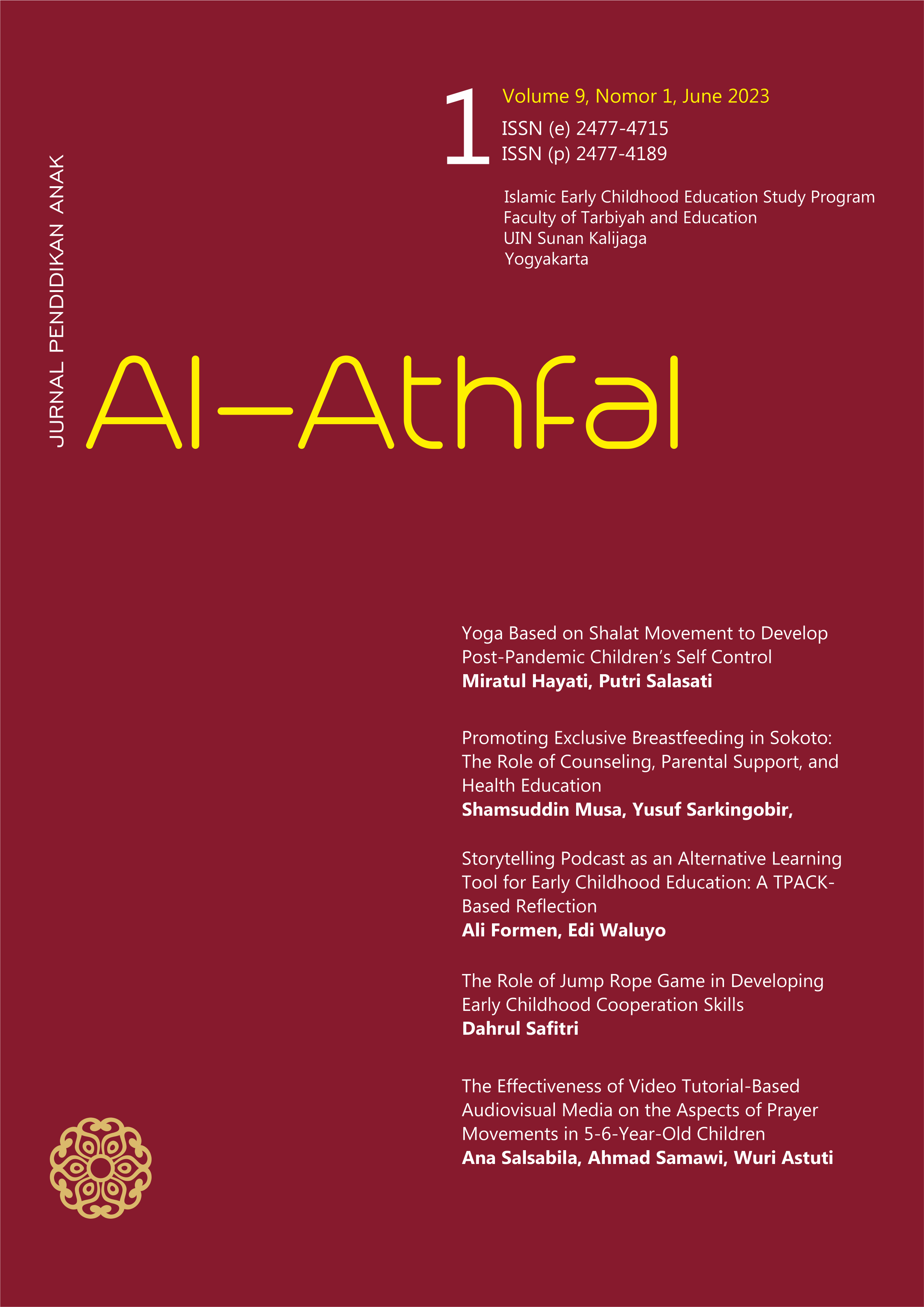356
Views
296
Downloads
 Open Access
Open Access
Knowledge of Early Childhood Education Teachers Regarding Zero Waste-Based Learning in the Coastal Area of Kamal
Main Article Content
Abstract
Purpose – This article aims to elucidate the knowledge of teachers in early childhood education institutions in the coastal area of Kamal regarding Zero Waste-based learning.
Design/methods/approach – The research was conducted using a survey that focused on Zero Waste-based learning. Questionnaires were administered to 118 teachers in early childhood education institutions in the coastal area of Kamal. The data obtained were then analyzed using a one-sample t-test.
Findings – The research findings indicate that the majority of teachers possess a high level of knowledge regarding Zero Waste-based learning. However, there is a minimal difference in the number of teachers with high and low levels of knowledge. Many teachers utilize recycled materials and natural resources for teaching materials.
Research implications/limitations – This study can serve as a basis for providing training to early childhood education institutions, enabling them to improve Zero Waste-based learning and instill environmental consciousness in young children.
Practical implications – This research highlights the need for collaboration between all parties involved in environmental sustainability and schools to enhance teachers' knowledge of appropriate environmental education for children. Ultimately, this can help children gain knowledge about the environment through specialized or integrated daily lessons.
Originality/value –This study serve as a reminder to teachers in Kamal's coastal area to enhance their knowledge of Zero Waste as a tool for educating future generations of young children.
Paper type Research paper
Keywords:
Article Details
How to Cite
Copyright

This work is licensed under a Creative Commons Attribution-NonCommercial 4.0 International License.
Authors who publish with this journal agree to the following terms:
- Authors retain copyright and grant the journal the right of first publication with the work simultaneously licensed under a Creative Commons Attribution License that allows others to share the work with an acknowledgment of the work's authorship and initial publication in this journal.
- Authors can enter into separate, additional contractual arrangements for the non-exclusive distribution of the journal's published version of the work (e.g., post it to an institutional repository or publish it in a book), with an acknowledgment of its initial publication in this journal.
- Authors are permitted and encouraged to post their work online (e.g., in institutional repositories or on their website) before and during the submission process. It can lead to productive exchanges and earlier and greater citation of published work.
How to Cite
References
Amusan, M. (2016). Cultivating Effective Pedagogical Skills In In-Service Teachers: The Role Of Some Teacher Variables. Journal Of The International Society For Teacher Education, 20(1), 83–89.
Arikunto, S. (2014). Prosedur penelitian : suatu pendekatan praktek. Rineka Cipta.
Bahtić, K., & Višnjić Jevtić, A. (2020). Young children’s conceptions of sustainability in Croatia. International Journal of Early Childhood, 52, 195–211. https://doi.org/10.1007/s13158-020-00266-4
Beattie, A. E. (2015). A Young Child’s Perspectives on Outdoor Play: A Case Study from Vancouver, British Columbia. International Journal of Early Childhood Environmental Education, 3(1), 38–53. https://naturalstart.org/sites/default/files/journal/journal_pages_38-53.pdf
Biddle, A. A. (2014). Early Childhood Education Becoming Profesional. SAGE Publications.
Bogusz, M., Matysik‐pejas, R., Krasnodębski, A., & Dziekański, P. (2021). The concept of zero waste in the context of supporting environmental protection by consumers. Energies, 14(2), 293–305. https://doi.org/10.3390/en14185964
Boyd, W. (2020). ‘Nothing Goes to Waste’: A professional learning programme for early childhood centres. Australasian Journal of Early Childhood, 45(1), 69–81. https://doi.org/10.1177/1836939119885313
Bulut, A. (2020). Teacher opinions about children’s awareness of zero-waste and recycling in the pre-school education years. Review of International Geographical Education Online, 10(3), 351–372. https://doi.org/10.33403/rigeo.689426
Darmawati & Purnomo, E. (2020). Pemahaman Guru Tentang Penanganan Sampah dan Penerapannya di Lingkungan Sekolah. JURNAL BASICEDU, 6(3), 3503–3513. https://doi.org/10.31004/basicedu.v6i3.2638
Debra A Miller. (2010). Beyound the Journal (Promoted by NAEYC. Gale, Cengage Learning.
Faizah, Ulifa Rahma, Y. P. D. (2017). Psikologi Pendidikan: Aplikasi Teori di Indonesia. Universitas Brawijaya Press.
Gomes, F. De. (2019). Analisis Kesulitan Guru Pauddalam Menilai Aspek-Aspek Perkembangan Aud Di Kecamatan Langke Rembong. Jurnal Pendidikan Dan Kebudayaan Missio, 11(2), 293–305. https://doi.org/10.36928/jpkm.v11i2.161
Hamalik, O. (2005). Kurikulum dan Pembelajaran. Bumi Aksara.
Hur, Rosita Ririn, D. (2016). Analisis Potensi dan Permasalahan Pengembangan Wilayah Pesisir di Kecamatan Arosbaya Kabupaten Bangkalan Madura Provinsi Jawa Timur. Jurnal Penyuluhan Perikanan Dan Kelautan, 14(2), 49–64. https://doi.org/10.33378/jppik.v14i2.202
Jayawardana, H. B. A. (2016). Pendidikan Karakter Peduli Lingkungan Sejak Dini sebagai Upaya Mitigasi Bencana Ekologis. Symbion (Symposium on Biology Education), 49–64.
Jevtic, A. V., Vodopivec, J. L., Beleslin, T. P., & Sindic, A. (2022). Višnjić-Jevtić2022_Article_UnmaskingSustainabilityInEarly.pdf (pp. 119–137).
Maria-Sabo, H., & Gavrilă, C. (2011). The Impact of Flooding And Environmental Education. Present Environment and Sustainable Development, 5(2), 159-166. https://pesd.ro/articole/nr.5/2/14.%20Sabo.pdf
Merrick, C., & Braus, J. (2013). Supporting Early Childhood Environmental Education through the Natural Start Alliance. International Journal of Early Childhood Environmental Education, 1(1), 32–40.
Murtadho, A. (2011). Mengembangkan Pendidikan Multikultural dalam Pembelajaran PAI Mengembangkan Pendidikan Multikultural dalam Pembelajaran PAI. Al-Tadzikyyah, 6(1), 1–17. http://ejournal.radenintan.ac.id/index.php/tadzkiyyah/article/view/1490
Putri, W. M. & R. P. (2021). mplementasi Nilai-Nilai Islam Dalam Pengembangan Pendidikan Berwawasan Lingkungan Hidup Bagi Anak Usia Dini di RA UIN Sunan Kalijaga dan Tk Khalifah. Edukatif: Jurnal Ilmu Pendidikan, 3(1), 144–148. http://dx.doi.org/10.32478/evaluasi.v7i2.1227
Rizki Tiara, D., & Pratiwi, E. (2020). Mengukur Kesiapan Guru Sebagai Dasar Pembelajaran Daring Di Lembaga PAUD. Jurnal Golden Age, 4(02), 362–368. https://doi.org/10.29408/jga.v4i02.2624
Rohinah. (2017). Implementasi Nilai-Nilai Islam Dalam Pengembangan Pendidikan Berwawasan Lingkungan Hidup Bagi Anak Usia Dini di RA UIN Sunan Kalijaga dan Tk Khalifah. Al-Athfal: Jurnal Pendidikan Anak, 3(1), 1–14. https://ejournal.uin-suka.ac.id/tarbiyah/alathfal/article/view/1539
Sukandar. (2016). Profil Desa Pesisir Provinsi Jawa Timur Volume III (Kepulauan Madura). Bidang Kelautan, Pesisir, dan Pengawasan Dinas Perikanan dan Kelautan Provinsi Jawa Timur.
Wilson, R. (2015). The Essence of Our Collective Work. International Journal of Early Childhood Environmental Education, 3(1), 5–7. https://naturalstart.org/sites/default/files/journal/journal_pages_5-7.pdf
